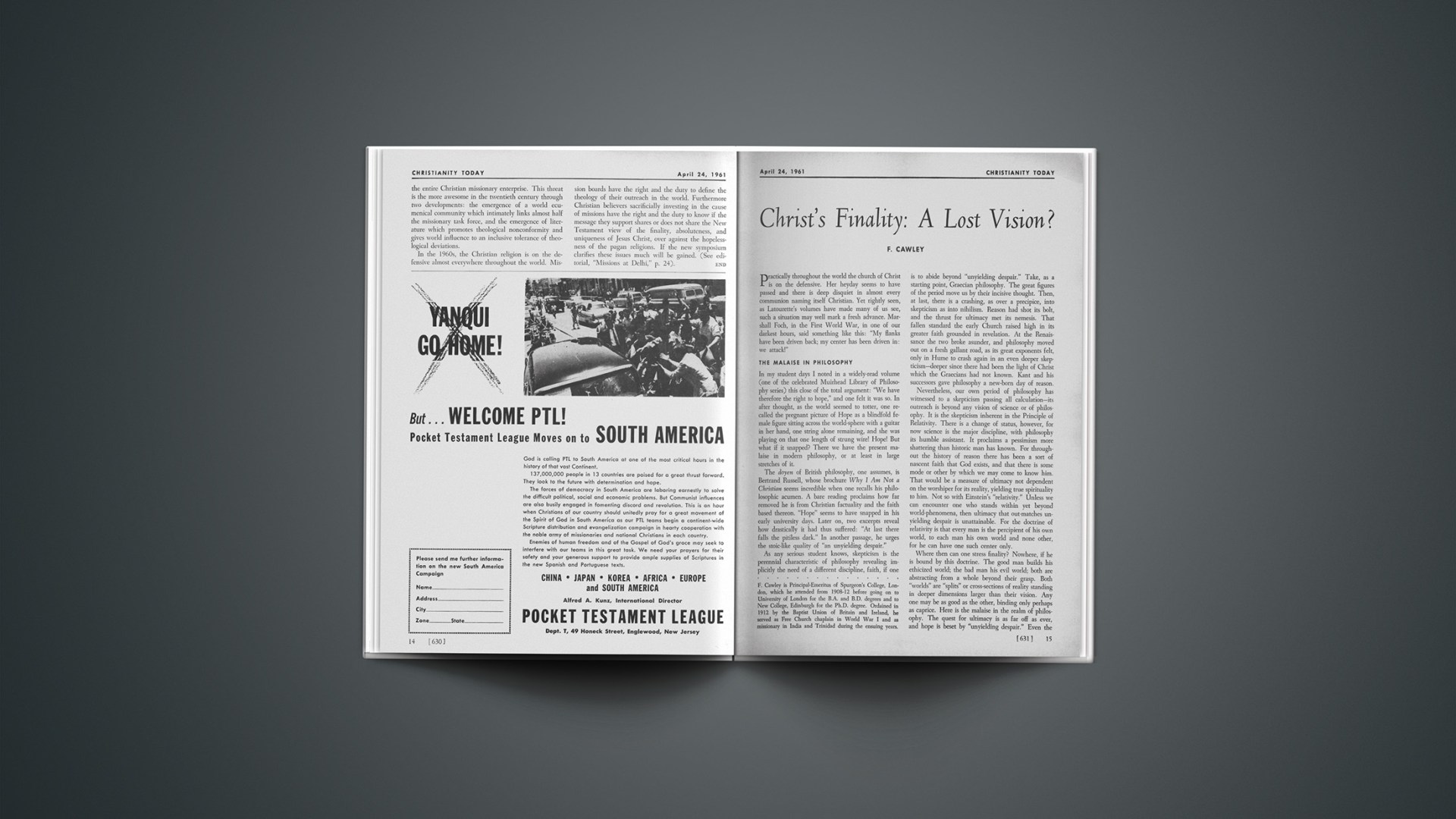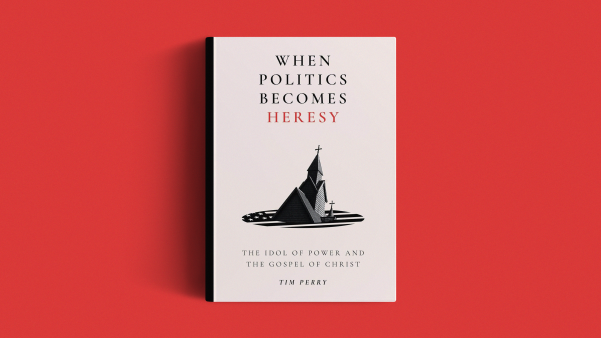Practically throughout the world the church of Christ is on the defensive. Her heyday seems to have passed and there is deep disquiet in almost every communion naming itself Christian. Yet rightly seen, as Latourette’s volumes have made many of us see, such a situation may well mark a fresh advance. Marshall Foch, in the First World War, in one of our darkest hours, said something like this: “My flanks have been driven back; my center has been driven in: we attack!”
THE MALAISE IN PHILOSOPHY
In my student days I noted in a widely-read volume (one of the celebrated Muirhead Library of Philosophy series) this close of the total argument: “We have therefore the right to hope,” and one felt it was so. In after thought, as the world seemed to totter, one recalled the pregnant picture of Hope as a blindfold female figure sitting across the world-sphere with a guitar in her hand, one string alone remaining, and she was playing on that one length of strung wire! Hope! But what if it snapped? There we have the present malaise in modern philosophy, or at least in large stretches of it.
The doyen of British philosophy, one assumes, is Bertrand Russell, whose brochure Why I Am Not a Christian seems incredible when one recalls his philolosophic acumen. A bare reading proclaims how far removed he is from Christian factuality and the faith based thereon. “Hope” seems to have snapped in his early university days. Later on, two excerpts reveal how drastically it had thus suffered: “At last there falls the pitiless dark.” In another passage, he urges the stoic-like quality of “an unyielding despair.”
As any serious student knows, skepticism is the perennial characteristic of philosophy revealing implicitly the need of a different discipline, faith, if one is to abide beyond “unyielding despair.” Take, as a starting point, Graecian philosophy. The great figures of the period move us by their incisive thought. Then, at last, there is a crashing, as over a precipice, into skepticism as into nihilism. Reason had shot its bolt, and the thrust for ultimacy met its nemesis. That fallen standard the early Church raised high in its greater faith grounded in revelation. At the Renaissance the two broke asunder, and philosophy moved out on a fresh gallant road, as its great exponents felt, only in Hume to crash again in an even deeper skepticism—deeper since there had been the light of Christ which the Graecians had not known. Kant and his successors gave philosophy a new-born day of reason.
Nevertheless, our own period of philosophy has witnessed to a skepticism passing all calculation—its outreach is beyond any vision of science or of philosophy. It is the skepticism inherent in the Principle of Relativity. There is a change of status, however, for now science is the major discipline, with philosophy its humble assistant. It proclaims a pessimism more shattering than historic man has known. For throughout the history of reason there has been a sort of nascent faith that God exists, and that there is some mode or other by which we may come to know him. That would be a measure of ultimacy not dependent on the worshiper for its reality, yielding true spirituality to him. Not so with Einstein’s “relativity.” Unless we can encounter one who stands within yet beyond world-phenomena, then ultimacy that out-matches unyielding despair is unattainable. For the doctrine of relativity is that every man is the percipient of his own world, to each man his own world and none other, for he can have one such center only.
Where then can one stress finality? Nowhere, if he is bound by this doctrine. The good man builds his ethicized world; the bad man his evil world; both are abstracting from a whole beyond their grasp. Both “worlds” are “splits” or cross-sections of reality standing in deeper dimensions larger than their vision. Any one may be as good as the other, binding only perhaps as caprice. Here is the malaise in the realm of philosophy. The quest for ultimacy is as far off as ever, and hope is beset by “unyielding despair.” Even the conception of God by so erudite a philosopher as A. N. Whitehead does not break loose from this malaise, since to him “the actuality of God must also be understood as a multiplicity of actual components in process of creation.” In answer, one of my former professors responded: “A God who is within the process is no God at all.” One recalls the profound parable of our Lord of the two men, one wise, the other foolish. What is clear amid this tangle of thought and counter thought is this: either we are committed to the Christian revelation of “the God and Father of our Lord Jesus Christ,” or we have no more assurance on ultimate issues than the man who built on sand, and who went down in final disaster.
Final disaster? Yes. That is no mere touch of rhetoric, since the principle of relativity has dealt hard with modern ethics, and has left to every value only an ultimacy measured by individual vision. No common moral yardstick remains; all is according to the individual’s stance. Reason, therefore, is suspect; moral reason the same. A paralyzing pessimism, as every deep-seated pessimism is bound to be, is settling over us. All the world over where men seek ultimate standards by which to judge and act, there is no real assurance of final light or worth or validity. The fundamental issue, therefore, lies between the living God of Revelation and the Heraclitean “flux.”
THE PLIGHT OF EDUCATION
This sense of relativity has had profound effect upon many of our leaders in thought and education. In America, in spite of an apparently religiously determined public opinion, no religious faith permeates academic convictions.
Recently I have been reading a book which has been given this commendation: “A major contribution … by one of the most competent specialists working in the field of personality patterns”: The Individual and His Religion, by Gordon W. Allport, professor of psychology in Harvard University. In a book given to psychological interpretation one does not of course expect a theological treatise. But one is justified to expect in a book which sets out to deal with religion at university levels, some mention at least of the name and influence of those who, in the long years of man’s religious quest and life, have influenced the whole world. The author is content however with “subjective religion.” In his closing pages on “The Nature of Faith” he states his position: “How the individual justifies his faith is a variable matter, and the certitude he achieves is his alone.” This is an honest book, sincere in intention. But of the two authorities who, by every calculus of judgment, have shaped the thought of all our modern civilization, no mention is made. This book is only two-dimensional—it lacks depth and height: there is no mention of the great prophets of Israel, and the name of Jesus is left out! The inference is that in an individual’s quest for finality and self-completion, the Christian faith need not even be considered.
A BREATHING SPACE
To many the present moment is a kind of breathing space, itself sharpening the challenge to the world-wide Church of Christ. Over a thousand million now live under the dominance of atheistic communism. In Africa there is a terrific race on the part of Islam to win its emerging peoples to that faith. A growing paganism is operative on all sides. On all final issues the only light one can see is that cast by Christ in the minds of those who see how in his wounded hands he consummates all that man has sought to know of “the purpose, the will, the love and the wrath of the Eternal God,” all of which lights up much of the inevitable mystery of God. In Him reason is given its final crown; in him, as revealed in the Scriptures, in nature, in history, and in conscience, faith finds the deepest niche in which to kneel and worship, while Christ redeems that believing heart. The lights that had earlier partly illuminated man’s adventures are going out; not a few have already expired. But there is one “Light” which the darkness has never overwhelmed: the light which flames from the face of Jesus Christ.
The poignancy lies just here: the Church has gone out in modern days to evangelize the masses, but she has left undone the evangelization of our foremost teachers and professors. Where at university levels, as was the case with Bertrand Russell, eager young men and women come for ultimate thought, they encounter skepticism. On a day of fierce wind and storm, with a bitter sleet adding to personal discomfort, I witnessed a mass of green sward, only known perhaps in these green islands, slowly blotted out by the feet of hundreds as they came from football galleries at the challenge of Billy Graham to embrace the finality of Christ. Among the first 12 persons was a man whose name was then world-wide as among the foremost adventurous spirits of the day, and with him came his wife. But that is not normal—for the foremost spirits of our day do not come to missions, and how he came I do not know. These men are hand-picked, as one picks rare fruit with careful hand.
At a conference where scholars on Old Testament work in history and language met for a session or two, I heard a lecture on Jewish law by an outstanding Jewish scholar. It happened that he and I sat together at the luncheon that followed. In the course of an easy chat I put forth, with some trepidation, a question that had been on my mind all the morning: “In your judgment, will the time come, near or remote, when the Jew will become a Christian?” His face sharpened at once. “I might answer you fiercely,” was his first word, “but I will not.… Rather in the spirit of the sincerity in which you have voiced your question.” Then, slowly, “the Jew will become Christian, when the Christian becomes Christian.” I was stilled to the core, and I recalled how much of anti-Semitism the Church had caused in the centuries since Christ. Further, he went on, “in this university town I know your churches, and their relative emptiness, and I have not been impressed by what I have seen or heard.”
There I heard the modern challenge; what is more, I felt it. The higher seats of our learning must be won for Christ, and the Church must see it as our major battle field. Its cost? “Nothing in my hand I bring. Simply to thy Cross I cling.” The heart of Paul, than whom Christ has not won a greater: “I am crucified with Christ; nevertheless I live; yet not I, but Christ liveth in me.” Paul won his earlier day for Christ, for the simple reason that Christ held all there was in Paul, and shone His deathless light through him. That same principle of faith, of life, and of light wins today wherever it may be. Where is it?” That is the challenge today. Our finest must leap to its call!
Samuel M. Shoemaker is the author of a number of popular books and the gifted Rector of Calvary Episcopal Church in Pittsburgh. He is known for his effective leadership of laymen and his deeply spiritual approach to all vital issues.










